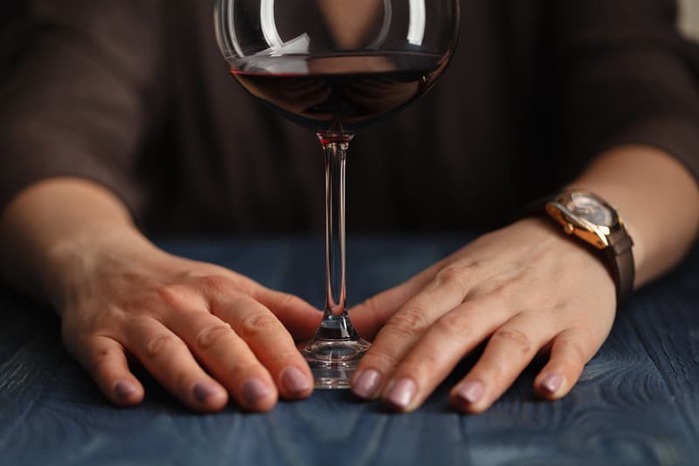- Calls to this hotline are currently being directed to Within Health, Fay or Eating Disorder Solutions
- Representatives are standing by 24/7 to help answer your questions
- All calls are confidential and HIPAA compliant
- There is no obligation or cost to call
- Eating Disorder Hope does not receive any commissions or fees dependent upon which provider you select
- Additional treatment providers are located on our directory or samhsa.gov
What is Drunkorexia?
Alcohol abuse and eating disorder behaviors are a worrying and dangerous combination that can result in severe negative impact to one’s medical, mental, and emotional health. While the term “drunkorexia” is non-medical, it does refer to very serious behaviors that can have lifelong implications if left unnoticed or untreated.
Drunkorexia Definition: What Is It?
The colloquial term “drunkorexia” refers to individuals that utilize alcohol in a method that aligns with, or perpetuates, their eating disorder behaviors.
A study published in The Journal of American College Health specifies that “drunkorexia is commonly characterized by the following behaviors: (a) skipping meals in order to “save” calories or compensate for increased caloric intake from consumption of alcoholic beverages, (b) excessive exercising in order to compensate for calories consumed from drinking, and/or (c) drinking excessive amounts of alcohol in order to become sick and purge previously consumed food [1].”
The key concept here is that drunkorexia involves a harmful combination of both disordered eating as well as problematic drinking behaviors. These behaviors are most commonly found in college students but are not limited solely to this population.

Statistics and Facts
- Over 80% of young drinkers engage in disordered eating and/or restriction prior to drinking [2].
- Approximately “one-third of university students report deliberately eating less food prior to alcohol use in an effort to compensate for alcohol calories they plan to consume [3].”
- College women are 1.5 times more likely to restrict food intake before drinking than men [3].
- Drunkorexia behaviors have been identified by researchers as occurring around the world, not just in America.
Drunkorexia Symptoms: What to Look For
There are signs of drunkorexia beliefs or behaviors, however, it is important to note that many of these are accepted as common by many, particularly if an individual is in college. Despite the assertion that college drinking is “harmless” and “youthful” fun, research indicates that problematic drinking behaviors that occur in college are likely to lead to lifelong substance use issues. As such, if you or a loved one is engaging in any of the following behaviors, there may be a larger issue that needs to be addressed.
Physical
Physical signs of drunkorexia are similar to those of eating disorders, as those behaviors mediate the binge drinking behaviors. Some physical signs might include:
- Gaining/losing noticeable weight in a short period of time.
- Dark circles under the eyes
- Impaired immune system
- Yellowing skin
- Thinning hair
- Gastrointestinal issues
- Alcohol poisoning
Behavioral and Emotional
Behavioral signs of drunkorexia are more easy to identify than physical signs and may include the following:
- Excessive exercising
- Expressing “regret” over caloric content of drinks
- Hyperfixation on compensating for alcohol consumed
- Low self-esteem
- Increased emotion dysregulation
- Reduced caloric intake
- Engaging in dieting behaviors
- Use/possession of laxatives/diuretics
- Binge eating followed by reported feelings of regret and/or shame
What Does Drunkorexia Do to the Body?
It should be unsurprising that engaging in eating disorder behaviors and excessive alcohol consumption long-term can cause serious damage to the body. Some long-term consequences of drunkorexia behaviors may include:
- Blackouts
- Alcohol poisoning
- Brain damage
- Liver disease
- Osteoporosis
- Gastrointestinal damage
- Cardiac problems
- Unwanted sexual activity
- Memory impairment
- Vitamin deficiency
- Difficulty maintaining career/relationships
What are the Causes of Drunkorexia?
It appears that the primary causes of drunkorexic behaviors stem from both cultural beliefs that glorify the thin ideal as well as binge drinking behaviors. It is for this reason that drunkorexic behaviors are likely more common in college students. These individuals are at higher risk for eating disorder behaviors and binge drinking behaviors separately, therefore, combining them becomes natural and accepted.
Individuals at this age are also undergoing the emotionally and psychologically overwhelming transition from high school to college, teen to young adult, and the stress and identity confusion this can create makes them more vulnerable to utilizing drinking and/or eating disorder behaviors as ineffective coping skills.
Further Reading
- Weight & Body Image
- Eating Disorder Statistic
- Eating Disorder Research, Studies, and Tests
- Eating Disorders in Men
A huge issue in drunkorexic behaviors is the fact that they are seen as “acceptable” not only by college students but by many adults, who may look at their college-aged children or students and simply say it is the life phase they are in.
Drunkorexic behaviors are always dangerous, regardless of the age, life stage, or current daily life of the individual engaging in them. If you recognize any of the above warning signs in an individual, there is great cause for concern and it is important to address it.
Drunkorexia Treatment: Getting Help
Receiving help for drunkorexia behaviors is not a small feat. As mentioned above, these behaviors are often socially accepted, therefore, recognizing them as problematic and seeking out the necessary support is a brave decision.

If you or a loved one has reached that place, do not hesitate to reach out to professionals for support. The most effective method of treatment for drunkorexia would be to receive comorbid treatment for both the eating disorder AND substance use beliefs and behaviors. However, recognize that treatment professionals may recommend engaging in medical stabilization of one or both to begin with, as the individual may be so malnourished they need medical support or may be at risk for experiences of alcohol withdrawal, which can be life threatening.
For those that seek support for drunkorexic tendencies, it can be the beginning of a journey focused on physical wellness and effective coping through adulthood.
Author: Margot Rittenhouse, MS, LPC, NCC
Page Last Updated & Reviewed By: Jacquelyn Ekern, MS, LPC on September 2, 2021
Published on EatingDisorderHope.com, Treatment Resources & Information on Eating Disorders

